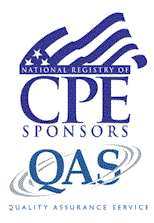Celebrating 26 years serving our friends and customers!
New--H.R. 1 Act - The One Big Beautiful Bill Mini Course
Ethics for DelawareCode: 24-EDE
Add to Cart
Course Details
This is a Delaware ethics course covering standards of professional conduct and business practices adhered to by accountants such as CPAs in order to enhance their profession and maximize idealism, justice and fairness when dealing with the public, clients and other members of their profession. It also presents an approach ‐‐the threats and safeguards approach –to coping with ethical dilemmas. The Sarbanes‐Oxley Act and its impact on business ethics, new internal control requirements, and the CPA’s responsibilities are summarized.
Chapter 3 discusses specific rules and regulations for Delaware CPAs.
Objectives:
After completing this course, you will:
- Define ethics.
- Differentiate between amoral and ethical values.
- List and characterize two systems of ethics.
- Differentiate between legal versus ethical codes
- Discuss ethical reasoning used by accountants.
- Illustrate ethical dilemmas encountered by accountants.
- Differentiate between rulings and principles of the AICPA Code of Professional Conduct
- Briefly describe the six principles and list the eleven rules of the AICPA Code of Professional Conduct
- Outline ethics rulings on independence.
- Resolve ethical dilemmas using the threats and safeguards approach, a conceptual framework.
- List the key features of corporate responsibility law (Sarbanes-Oxley act) that influence auditor independence.
- List consulting services prohibited by the Sarbanes-Oxley (SOX) Act of 2002.
- Explain licensing and disciplinary mechanisms within the profession.
- Outline the Standards for Tax Services.
- Discuss cases of ethical violations.
- Discuss Delaware statutes and regulations governing the practice of public accountancy
- Outline the professional ethics and conduct for Delaware CPAs.
Presentation Method: QAS Self-Study
Category: Regulatory Ethics
CPE credit: 4 Hours
Program Level: Update
Prerequisites: None
Advanced Preparation: None
Exam expiration date: Participants must submit exams for grading within one year from the date of purchase



